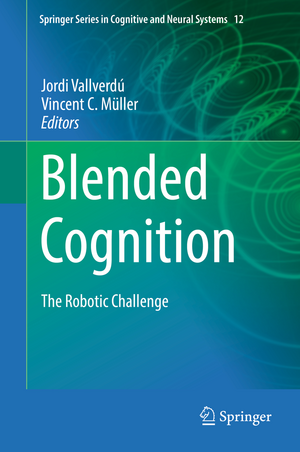Blended Cognition: The Robotic Challenge: Springer Series in Cognitive and Neural Systems, cartea 12
Editat de Jordi Vallverdú, Vincent C. Mülleren Limba Engleză Hardback – 26 apr 2019
This edited volume is about how unprejudiced approaches to real human cognition can improve the design of AI. It covers many aspects of human cognition and across 12 chapters the reader can explore multiple approaches about the complexities of human cognitive skills and reasoning, always guided by experts from different but complimentary academic fields.
A central concept is explained: blended cognition, the natural skill of human beings for combining constantly different heuristics during their several task-solving activities. Something that was sometimes observed like a problem as “bad reasoning”, is now the central key for the understanding of the richness, adaptability and creativity of human cognition. The topic of this book connects in a significant way with the disciplines of psychology, neurology, anthropology, philosophy, logics, engineering, logics, and AI. In a nutshell: understanding better humans for designing better machines. Any person with interests on natural and artificial reasoning should read this book as a primary source of inspiration and a way to achieve a critical thinking on these topics.
A central concept is explained: blended cognition, the natural skill of human beings for combining constantly different heuristics during their several task-solving activities. Something that was sometimes observed like a problem as “bad reasoning”, is now the central key for the understanding of the richness, adaptability and creativity of human cognition. The topic of this book connects in a significant way with the disciplines of psychology, neurology, anthropology, philosophy, logics, engineering, logics, and AI. In a nutshell: understanding better humans for designing better machines. Any person with interests on natural and artificial reasoning should read this book as a primary source of inspiration and a way to achieve a critical thinking on these topics.
Preț: 948.92 lei
Preț vechi: 1157.22 lei
-18% Nou
Puncte Express: 1423
Preț estimativ în valută:
181.62€ • 188.90$ • 152.20£
181.62€ • 188.90$ • 152.20£
Carte disponibilă
Livrare economică 20 februarie-06 martie
Preluare comenzi: 021 569.72.76
Specificații
ISBN-13: 9783030031039
ISBN-10: 3030031039
Pagini: 390
Ilustrații: X, 304 p. 54 illus., 24 illus. in color.
Dimensiuni: 155 x 235 mm
Greutate: 0.54 kg
Ediția:1st ed. 2019
Editura: Springer International Publishing
Colecția Springer
Seria Springer Series in Cognitive and Neural Systems
Locul publicării:Cham, Switzerland
ISBN-10: 3030031039
Pagini: 390
Ilustrații: X, 304 p. 54 illus., 24 illus. in color.
Dimensiuni: 155 x 235 mm
Greutate: 0.54 kg
Ediția:1st ed. 2019
Editura: Springer International Publishing
Colecția Springer
Seria Springer Series in Cognitive and Neural Systems
Locul publicării:Cham, Switzerland
Cuprins
Preface .- Philosophy.-Blended cognition The robotic challenge.- Manipulative Abduction, External Semiotic Anchors, and Blended Cognition.- Practical Reasoning in the Deliberations of an Intelligent Autonomous Agent.- Blended Automation: The Language-Game of Psychoanalytic Automatism and Cybernetic Automata.-Engineering.- Can our Robots rely on an Emotionally Charged Vision-for- Action? An Embodied Model for Neurorobotics .- Modeling psycho-emotional states via neurosimulation of monoamine neuro-Transmitters.- Towards Conversation Envisioning for Cognitive Robots.- Psychology.- The blending of human and autonomous-machine cognition.- Heuristics of Numerical Choice in Economic Contexts.- Anthropology.- Towards autonomous artificial agents? Proposal for a naturalistic activity-based model of (artificial) life.- Logics.- Toward a Logic of Everyday Reasoning.-Index.
Textul de pe ultima copertă
This edited volume is about how unprejudiced approaches to real human cognition can improve the design of AI. It covers many aspects of human cognition and across 12 chapters the reader can explore multiple approaches about the complexities of human cognitive skills and reasoning, always guided by experts from different but complimentary academic fields.
A central concept is explained: blended cognition, the natural skill of human beings for combining constantly different heuristics during their several task-solving activities. Something that was sometimes observed like a problem as “bad reasoning”, is now the central key for the understanding of the richness, adaptability and creativity of human cognition. The topic of this book connects in a significant way with the disciplines of psychology, neurology, anthropology, philosophy, logics, engineering, logics, and AI. In a nutshell: understanding better humans for designing better machines. Any person with interests on natural and artificial reasoning should read this book as a primary source of inspiration and a way to achieve a critical thinking on these topics.
A central concept is explained: blended cognition, the natural skill of human beings for combining constantly different heuristics during their several task-solving activities. Something that was sometimes observed like a problem as “bad reasoning”, is now the central key for the understanding of the richness, adaptability and creativity of human cognition. The topic of this book connects in a significant way with the disciplines of psychology, neurology, anthropology, philosophy, logics, engineering, logics, and AI. In a nutshell: understanding better humans for designing better machines. Any person with interests on natural and artificial reasoning should read this book as a primary source of inspiration and a way to achieve a critical thinking on these topics.
Caracteristici
Explains the central concept of Blended Cognition Connects a variety of disciplines Includes authoritative contributions from different academic fields











